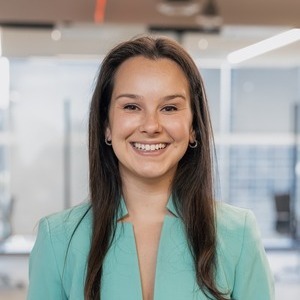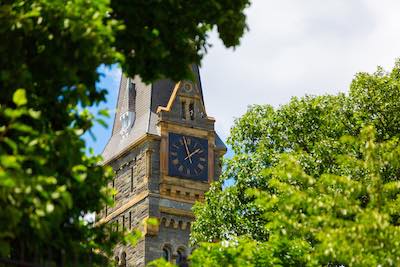By age 27, Katiana Krawchenko had shouted questions at then-President Donald Trump over the whir of a White House helicopter. She’d followed Melania Trump through three states as the former First Lady plugged her “Be Best” campaign against opioid addiction and cyberbullying. As a former White House Producer for CBS News, Krawchenko once set up an exclusive interview with then-Education Secretary Betsy DeVos and shared a stack of Dunkin’ Donuts with former Energy Secretary Rick Perry in the basement cafeteria of the U.S. Department of Energy.
But being interviewed herself? That was different.
“Oh, gosh, I’ve got to talk about myself?” she asked at the start of a Zoom interview. “Oh, Lord.”
But ask her to talk about what she cares about—and she cares about a lot—and a portrait emerges of the kind of student the Master of Arts in Liberal Studies program was made for: a student who uses the interdisciplinary liberal studies curriculum as a framework for understanding the world and her place in it; who yearns to explore what that world offers, and what it expects of her in return.

“Georgetown has provided me with this framework to draw from all my varying experiences and channel my love of learning and curiosity,” said Krawchenko, who plans to graduate in May. “I’ve been able to think about them and apply them to this wonderful program. And it’s given me just a broader view of the world and a chance to explore issues, topics, and people that I wouldn’t have otherwise.”
A Different Kind of Master’s Degree
The terms “liberal arts” and “liberal studies” are often used interchangeably, but they are not the same thing, said Charles McNelis, faculty director of the liberal studies programs at Georgetown. “Liberal arts” is an umbrella term, encompassing all the sciences and humanities. Students in the liberal arts typically take a varied curriculum before focusing on a particular major. By contrast, liberal studies “takes an integrated view of those areas and blends them into one curriculum.”
Because it asks students to explore connections across disciplines, liberal studies puts a premium on creativity, initiative, and problem-solving. This program is not for everyone, but for those who are eager to explore these connections—and the connections between their studies, their work, and their lives overall—liberal studies can be a great fit.
“These students show up every day, prepared,” said Assistant Dean Trey Sullivan. “They operate with a sense of humility. They operate with a sense of deep hospitality in the way they approach the intellectual process, come to the classroom ready to defend their viewpoint and their perspective, but also make space, in a spirit of open-mindedness, for other perspectives and other ideas. Katiana, in my experience, is in that group.”
Making a Change
Krawchenko left CBS in 2019 and is now senior director, broadcast media, for Avoq, an advocacy firm that assists companies and organizations—particularly those concerned with social justice and public health issues—in promoting their messages. She values her seven years at the network and said it was “the best communications education I could have asked for.” But, despite all the excitement and glamor (at least, as seen from the outside), she felt there was something about it that didn’t quite fit. She wanted to make a difference with the journalism training she received at the University of Florida. And working with the White House press corps and chasing the latest story—sometimes about something as apparently trivial as one politician insulting another—didn’t seem to be the best way to accomplish that.
So, as she has many times in the past, she went to her grandmother for advice. Krawchenko’s ancestors emigrated from Ukraine to rural Manitoba in 1896 and struggled enormously for several generations. And while her grandmother’s life was not as hard as her forebears, she also grew up poor. She told Krawchenko stories about taking care of her younger brother when they were children, and how she would boil potatoes for dinner, then feed him “the actual potato” while she ate the skin.
“I struggled with, you know, ‘God, my ancestors were suffering,’” Krawchenko recalls thinking. “‘What I’m dealing with is nothing compared to that.’ And my grandmother told me that sometimes you have to pick up your bootstraps” and go in a different direction.
The Perfect Program
Even while she was at CBS, Krawchenko wanted to pursue more education, and eventually, she would become the first in her family to earn a graduate degree. She said her undergraduate training in journalism was excellent but was largely technical, and she felt there were big gaps in her knowledge.
In 2018, she took a sample course in a liberal studies program—“1960s: Decade of Transformation,” taught by Gregory Havrilak, Ph.D.—“and loved it, absolutely loved it.” But at the time she thought her schedule was too packed to consider the program.
However, during the pandemic, she felt it was time to take that step.
Originally, she planned to concentrate her studies on Russian history and politics because of her family’s Ukrainian background and Ukraine’s fraught relationship with its neighbor. But in the Statement of Purpose section of her application, she also talked about applying “studies of racial inequality, public health, history, and ethics at Georgetown” to her work helping organizations “shape their change-making messages.” Her master’s thesis explains why expanding broadband connectivity in underserved areas that are often rural and poor is critical to public health.
A Source of Inspiration
If that subject harkens back to her Statement of Purpose, it is no coincidence. In that statement, Krawchenko talked about her ancestors, who immigrated to Canada more than a century ago, and how their perseverance during that first brutal winter inspires her today.
“Needs assistance bad” is how a government visitor described most of the 36 immigrant households he surveyed, whose houses were literally dug into the soil, she wrote. “He recalled my great-great grandfather Pietro Strumbicki’s home as one with ‘8 souls, small house, children all small, no stock, no nothing.’”
She concluded: “I hope to make my ancestors proud and have them know that starting with ‘no nothing’ inspires me every day to do the best that I can in their honor."
